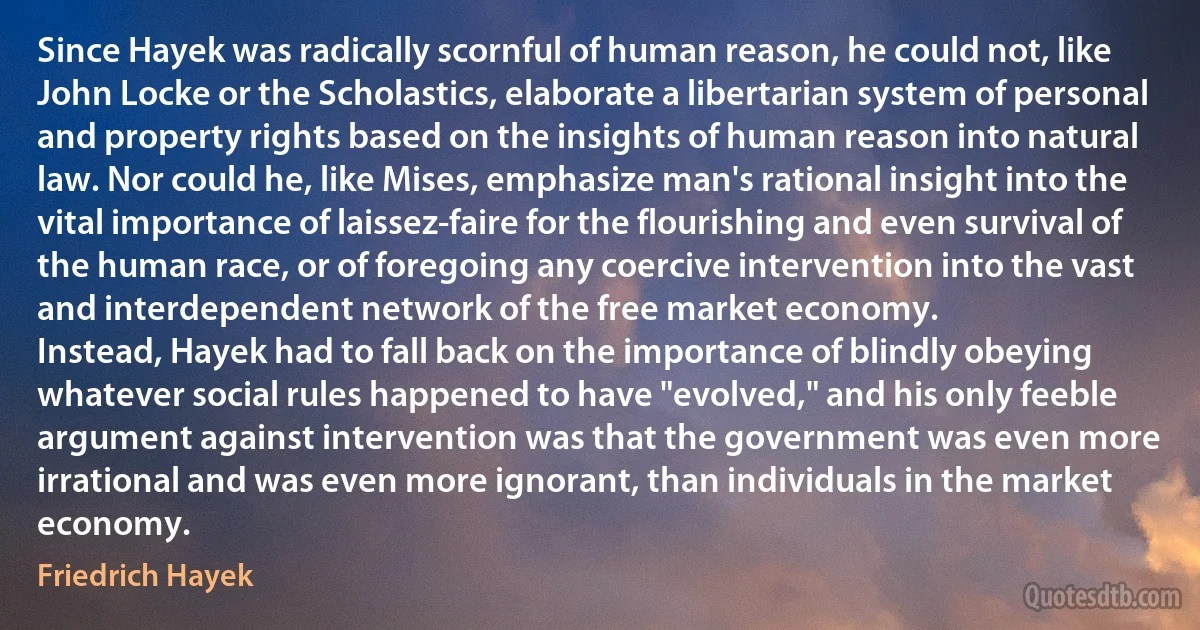
Since Hayek was radically scornful of human reason, he could not, like John Locke or the Scholastics, elaborate a libertarian system of personal and property rights based on the insights of human reason into natural law. Nor could he, like Mises, emphasize man's rational insight into the vital importance of laissez-faire for the flourishing and even survival of the human race, or of foregoing any coercive intervention into the vast and interdependent network of the free market economy. Instead, Hayek had to fall back on the importance of blindly obeying whatever social rules happened to have "evolved," and his only feeble argument against intervention was that the government was even more irrational and was even more ignorant, than individuals in the market economy.
Friedrich HayekRelated topics
argument fall flourishing free government human ignorant intervention irrational john law libertarian market natural network nor property race reason vast vital whatever locke Hayek RulesRelated quotes
There was only the choice between Communism and Hitler, and I will tell you why Hitler won. People will not give up religion, rights, freedom of personality, the opportunity to develop by individual effort - which includes private property. And the other reason for Hitler's winning is that if a whole people is treated as the Germans were, everyone will say, 'Are we worse people than others? Are we of a minor race?' Just as every single individual needs and must have self-respect, just as every family is proud of decent traditions, so every nation wants to maintain her individual manner, culture, language, and customs. It was in these respects that Communism failed. The Communists said that God was nonsense and stupidity and preached internationalism without maintaining the natural national feelings of a nation.

Hjalmar Schacht
The main form of crude communism is based upon emotional antipathy towards private property, and asserts that all men should be reduced to a similar level, so that everyone has an equal share of property. This is not genuine communism, Marx asserts, since it rests upon the same sort of distorted objectification of labor as is found in the theory of political economy. Crude communism of this sort becomes impelled towards a primitive asceticism, in which the community has become the capitalist instead of the individual. In crude communism, the rule of property is still dominant, but negatively: "Universal envy setting itself up as a power is only a camouflaged form of cupidity which re-establishes itself and satisfies itself in a different way.”.

Anthony Giddens
What I do not see is the argument...that we ought somehow to go on a quite different issue, a purely economic issue, to this new extreme which seems, greatly to my regret, to have inspired part of my party. There are no longer the principles of Lord Shaftesbury, Mr. Disraeli or Mr. Churchill. We are reverting to a form of neo-Cobdenism based upon the worst elements of the Manchester school, supported by aphorisms that would have done honour to that popular writer, Dr. Samuel Smiles. The paternalist elements and traditions of the Tory Party that come from its very roots are now unpopular. We are making a great error. It is because the people as a whole trusted those whom they regarded as their natural leaders to help them, support them and protect them that we have had the great authority in the past in our country.

Harold Macmillan
To make a law final, so as not to be reached by Congress, is, by mere legislation, to fasten a new provision on the Constitution. Nay, more; it gives to the law a character which the very Constitution docs not possess. The wise fathers did not treat the country as a Chinese foot, never to grow after infancy; but, anticipating Progress, they declared expressly that their great Act is not final. According to the Constitution itself, there is not one of its existing provisions - not even that with regard to fugitives from labor - which may not at all times be reached by amendment, and thus be drawn into debate. This is rational and just. Sir, nothing from man's hands, nor law, nor constitution, can be final. Truth alone is final.

Charles Sumner
It is not of special importance to me what the law says about marriage. It is of overwhelming importance, however, who it is that rules me. Today's decree says that my Ruler, and the Ruler of 320 million Americans coast-to-coast, is a majority of the nine lawyers on the Supreme Court. The opinion in these cases is the furthest extension in fact-and the furthest extension one can even imagine-of the Court's claimed power to create "liberties” that the Constitution and its Amendments neglect to mention. This practice of constitutional revision by an unelected committee of nine, always accompanied (as it is today) by extravagant praise of liberty, robs the People of the most important liberty they asserted in the Declaration of Independence and won in the Revolution of 1776: the freedom to govern themselves.

Antonin Scalia
